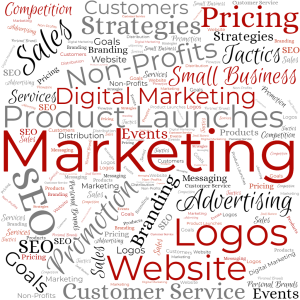
Marketing is something almost everyone has heard of and we’ve all experienced the result of it in one form or another. But not everyone knows exactly what marketing is or why you should market your business.
Merriam-Webster defines marketing as “the process or technique of promoting, selling, and distributing a product or service.” Marketing has taken many forms over the course of time and, unfortunately, its misuse has created a lot of misconceptions.
Common Marketing Misconceptions
1. Advertising equals marketing.
Those two terms are NOT synonymous. Rather, advertising is simply a single piece of a marketing strategy. Only budgeting for advertising can leave your strategy, and your business, wanting.
2. Marketing is untrustworthy.
Dishonest marketers throughout history have used manipulation and sometimes outright lies to promote products or services that don’t (or can’t) deliver on the marketed promises. In those cases, marketing is being used to achieve goals at any cost…including the cost of the business’ reputation. But that type of underhanded practice does not accurately represent marketing’s function within a business.
3. Marketing has nothing to do with other functions of a business and, therefore, operates on its own, sometimes in a vacuum.
A huge part of marketing is all about crafting the way a business does business. This encompasses everything from the logo and colors the company chooses to use to how customer service handles customer inquiries and sales. Marketing impacts how you talk about a business message, products or services and how every part of the interaction with the customer is handled, from first hearing about the business to becoming a regular customer to even ending the customer relationship! Marketing is a full life-cycle part of business operations.
4. Marketing is the fluff of a business budget.
This way of thinking leads businesses to cut the very thing that can help them grow their business during lean times – which is when they most need good marketing! Thinking of marketing as fluff can inhibit business growth. This doesn’t mean that the marketing budget should never be controlled – there are certainly ways to trim and be smart with spending – but its place in a business strategy and budget should always be understood and preserved.
6. Marketing should be a sure thing that doesn’t change very often.
Marketing is all about being flexible and adapting your plan! Not every strategy or tactic will work for each business – just because it works for your competitor, doesn’t mean it will work for you! And sometimes factors change and require you to adapt a strategy or tactic that was previously successful for you. Marketing always needs to be re-evaluated to make sure you’re getting the best bang for your buck. If something isn’t providing a good return on your investment, then it’s okay to change things up and try something else. Being flexible with your marketing will enable you to be more successful!
Moving Beyond the Misconceptions
If you have fallen prey to any of those misconceptions, you’re not alone! But the good news is, it’s not too late to take steps to incorporate successful marketing strategies and tactics for your business!
To get started, here are some questions you need to answer.
(Click here to download a FREE worksheet to make it easy.)
- What does your business, brand, or non-profit do?
- Who is your ideal customer or participant? (Really describe the attributes about them that make them ideal for what you do. For example, if you sell motorcycles, one key attribute of your ideal customer would be someone who has their motorcycle license.)
- List out a few of your competitors.
- What makes you different from your competitors? Why should your customer or participant choose you over others? (These questions may have the same answers or your answers might be slightly different.)
- What are your goals? (What do you ultimately want to achieve? For example, expand to multiple branches, achieve $X in sales/fundraising dollars, hire 10 employees, create a new product line, grow customer/participant base, etc, etc, etc)
- How much do you want to spend (or can you spend) to achieve these goals? Keep in mind that, on average, marketing should account for approximately 7-10% of your business budget. But these numbers will vary based on your industry, your goals, and your target audience.
Answering those questions will give you a great foundation for beginning your marketing plan and activities.
If you would like some help with marketing your business, book a consultation with us! We would be happy to discuss your needs and how we can provide Tactics that Target your goals!

